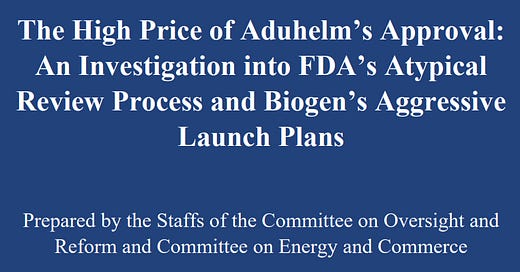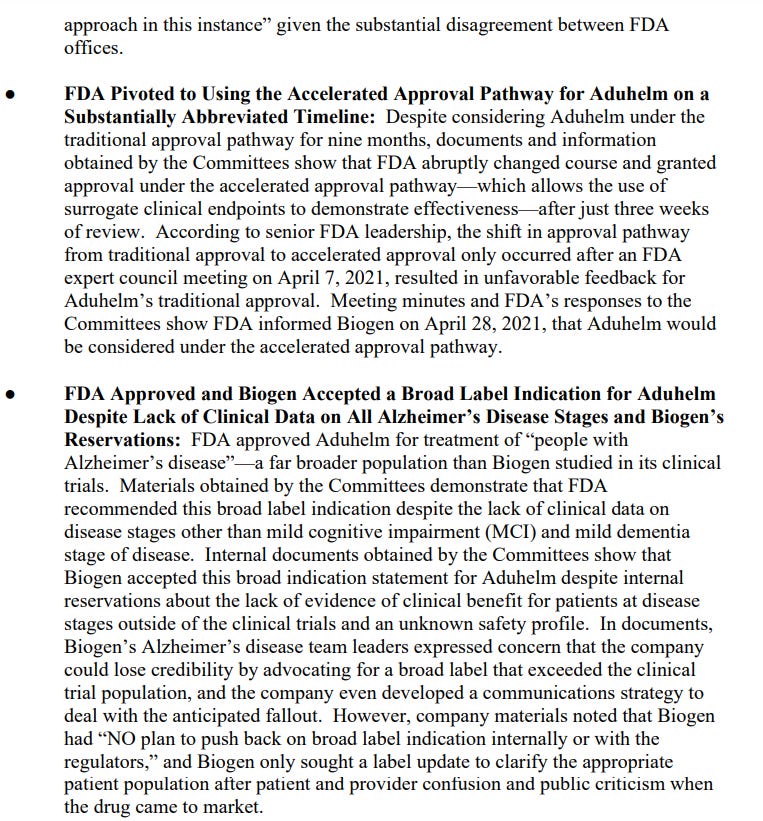New report suggests FDA did not follow typical guidance in fast-tracked approval of Biogen's Alzheimer's drug Aduhelm (Aducanumab)
Issues continue to mount as more drugs receive fast-tracked approval status and obfuscate typical regulatory pathways.
One of my first Substack posts was in regards to Biogen’s Alzheimer’s drug Aduhelm (Aducanumab), an immunotherapy developed to target the amyloid plaques found in Alzheimer’s dementia.
The drug gained fast-tracked approval in the summer of 2021, and was an example of a growing trend in the FDA’s rushed approval of therapeutics.
The approval was seen as so controversial that 3 members of the FDA advisory committee resigned, with the following written in a BMJ editorial from June 2021 about this event1:
Three members of a US Food and Drug Administration (FDA) advisory committee, which advised against authorising the Alzheimer’s disease drug aducanumab because of a lack of efficacy, have resigned after the agency went ahead and approved it.1
One of those who resigned, Harvard professor of medicine Aaron Kesselheim, wrote in a letter to acting FDA commissioner Janet Woodcock that the approval of Biogen’s drug was “probably the worst drug approval decision in recent US history.”
Kesselheim was joined in resignation by Mayo Clinic neurologist David Knopman and Washington University neurologist Joel Perlmutter. They were all members of the independent Peripheral and Central Nervous System Drugs Advisory Committee.
Aducanumab—which costs $56 000 (£40 000; €46 000) per year per patient— was approved through the FDA’s accelerated approval pathway, which is used when there are uncertainties over efficacy but there is an expected clinical benefit.
In a post on social media,2 Kesselheim said that “accelerated approval is not supposed to be the backup that you use when your clinical trial data are not good enough for regular approval.”
As stated before, this is an example of how fast-tracked approval of pharmaceuticals has been opened through the COVID vaccines, and possibly through The Right to Try Act, which may obfuscate regular approval processes for quicker, less robust clinical assessments.
The fallout from such an approval didn’t stop there, as eventually Biogen had to cut the cost of their immunotherapy, with an initial annual price at $56,000, in half due to many insurance companies not willing to pay for this treatment.
There were other issues as well, including the European Medicines Agency choosing not to bring Aduhelm to the European market due to lack of clinical evidence.
And at the time of the post both Biogen and the FDA were investigating the death of a 75-year old woman who suffered myloid-related imaging abnormalities events (ARIA-E), in this case brain swelling— a common side effect of Alzheimer’s immunotherapies. More can be found in my post from April.
NOW, even with all of these controversies Biogen pushed onward, and eventually reported “positive” results with a new immunotherapy, in partnership with a Japanese pharmaceutical company Eisai, called Lecanemab in a September 2022 press release.
But Lecanemab’s results came at an awkward time, as months before Science released an investigative report which found that one of the most widely cited Alzheimer’s studies may have been using falsified data.
This amyloid plaque found in this study, named Aβ*56, has been the target for many developing immunotherapies, and according to Science’s article many of the blots used many have been manipulated, raising questions as to the actual value of these amyloid plaques or if they even exist.
The revelations have been so dramatic that many scientists have even called for a restart to the whole field of Azlheimer’s research.
It’s because of these two together, along with Lecanemab’s similar results to Aduhelm, that I raised serious questions towards continuous approval of Alzheimer’s drugs which fail to show effectiveness, carry serious costs, and may result in serious side effects.
All of this is critical, because just today a joint House Investigation Committee released a damning report, castigating the FDA for Aduhelm’s fast-tracked approval, citing corporate greed as being one of the main reasons for the drugs approval.
I haven’t been able to read through the entire document yet, but the summary notes the following (apologies for the format, as this seemed to be the “best” way to organize the summary):
As we deal with the fast-tracked approval of different COVID vaccines, we are entering into an era in which many drugs will be fast-tracked under the guise of solving a modern healthcare catastrophe.
Alzheimer’s is just one of many modern maladies. We may soon find fast-tracked approval reaching diabetes, obesity, and Parkinson’s pharmaceuticals as well.
In some regards, the floodgates have been opened to rush drugs to market, spurred on by public perception that both encourage and push for such rushed approvals without daring to think of the ramifications when bypassing stringent trials and approval methods.
I may plan to look deeper into the document in the future, but once again this should serve as a reminder that more drugs will continue to be pushed through, and we should remember that public perception is a big driving force in this process.
Don’t let your want of a treatment make way for such rushed approvals to be made. This is a clear example of why we should be careful of what we wish for.
If you enjoyed this post and other works please consider supporting me through a paid Substack subscription or through my Ko-fi. Any bit helps, and it encourages independent creators and journalists outside the mainstream.

Mahase E. Three FDA advisory panel members resign over approval of Alzheimer’s drug BMJ 2021; 373 :n1503 doi:10.1136/bmj.n1503










Our public health agencies are beneath contempt. They do not even bother to conceal their corruption anymore. And why should they? No one will stop them or fix anything. The media will ignore it as they always do.
The For Drug Administration is basically a cheerleading and promotion squad for BIG HARMA